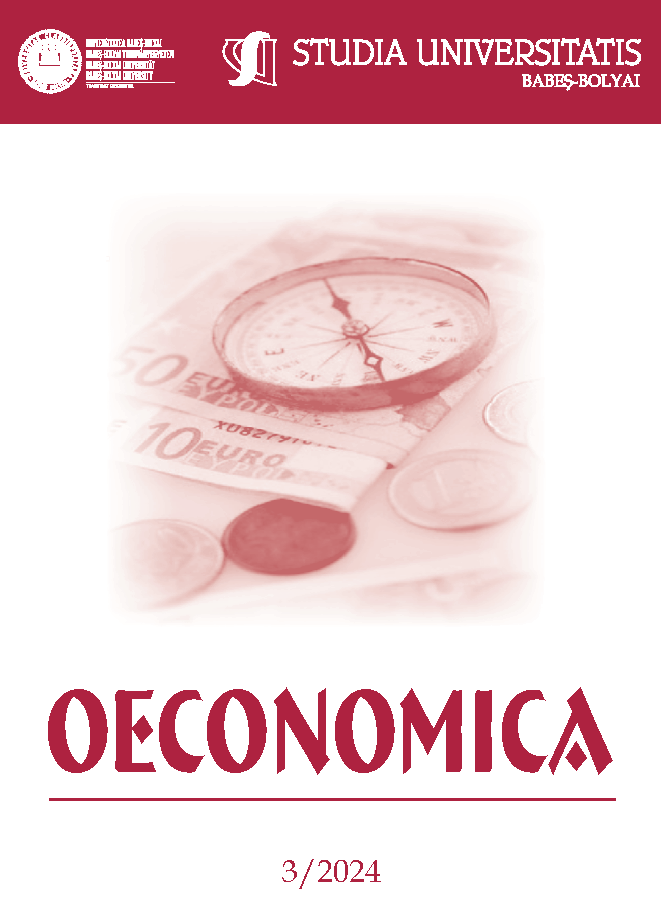EXPLORING THE LINK BETWEEN ROMANIAN ACCOUNTING STUDENTS’ GOAL ORIENTATIONS, SELF-EFFICACY, TEST ANXIETY AND PERFORMANCE: A CLUSTER ANALYSIS APPROACH
DOI:
https://doi.org/10.2478/subboec-2024-00015Keywords:
financial accounting education, learning motivation, self-efficacy, test anxiety, academic performance, Achievement Goal TheoryAbstract
This empirical study examines the relationship between learning motivation, self-efficacy, test anxiety, and academic performance in the context of a Financial Accounting course, using Achievement Goal Theory (AGT) as a framework. A sample of 149 second-year students enrolled in the Accounting and Management Information Systems program completed a questionnaire based on the Motivated Strategies for Learning Questionnaire (MSLQ). The data were analyzed using correlation, cluster analysis, and ANCOVA. The results confirmed significant differences between four motivational profiles: mastery, performance, multiple goals, and low motivation, regarding their impact on self-efficacy, test anxiety, and performance. The findings suggest that students with multiple goals achieve better academic outcomes, emphasizing the importance of a multidimensional approach to learning motivation.
JEL classification: A22, I23, M41.
References
Ahmad Z., Anantharaman R. N., Ismail H. (2012) Students’ motivation, perceived environment and professional commitment: an application of Astin’s college impact model, Accounting Education: An International Journal, 21(2), 187-208
Ames C., Archer J. (1988) Achievement goals in the classroom: Students’ learning strategies and motivation processes, Journal of Educational Psychology, 80(3), 260-267
Bandura A. (1977) Self-efficacy: Toward a unifying theory of behavioral change, Psychological Review, 84(2), 191-215
Bandura A. (1997) Self-Efficacy: The Exercise of Control, W.H. Freeman, New York
Becker L. (2013) Self-Regulated Learning Interventions in the Introductory Accounting Course: An Empirical Study. Issues in Accounting Education, 28(3), 435-460.
Cassady J. C., Johnson R. E. (2002) Cognitive test anxiety and academic performance, Contemporary Educational Psychology, 27(2), 270–295
Daniels L. M., Stupnisky R. H., Pekrun R., Haynes T. L., Perry R. P., Newall N. E. (2008) A longitudinal analysis of achievement goals: From affect to action, Journal of Educational Psychology, 100(3), 903–919
Dull, R. Schleifer L. McMillan J. (2015) Achievement Goal Theory: The Relationship of Accounting Students’ Goal Orientations with Self-efficacy, Anxiety, and Achievement, Accounting Education: an international journal, 24(2), 152-174
Dweck C. S., Leggett E. L. (1988) A social-cognitive approach to motivation and personality, Psychological Review, 95(2), 256–273
Elliot A. J., Church M. A. (1997) A hierarchical model of approach and avoidance achievement motivation, Journal of Personality and Social Psychology, 72(1), 218-232
Elliot A. J., McGregor H. A. (2001) A 2x2 achievement goal framework, Journal of Personality and Social Psychology, 80(3), 501-519
Harackiewicz J. M., Barron K. E., Elliot A. J. (1998) Rethinking achievement goals: When are they adaptive for college students and why? Educational Psychologist, 33(1), 1-21
Hart D., Wang X. (2016) The impact of self-efficacy and anxiety on accounting students’ perceptions of performance, Accounting Education, 25(3), 235–255
Haynes T. L., Daniels L. M., Stupnisky R. H., Perry R. P., Hladkyj S. (2008) The effect of achievement goals on mastery and performance learning in college students, Journal of Educational Psychology, 100(3), 903–919
Midgley C., Kaplan A., Middleton M. (2000) Performance-approach goals: Good for what, for whom, under what conditions, and at what cost? Journal of Educational Psychology, 92(1), 77-86
Miller M. D. (2014) Minds Online: Teaching Effectively with Technology, Harward University Press, Cambridge
Nicholls J. G. (1984) Achievement motivation: Conceptions of ability, subjective experience, task choice, and performance, Psychological Review, 91(3), 328–346
Nicholls J. G., Patashnick M., Nolen S. B. (1985) Adolescents’ theories of education, Journal of Educational Psychology, 77(6), 683–692
Opdecam, E., Everaert P., Keer H. V., Buysschaert, F. (2012) Preferences for team learning and lecture-based learning among first-year undergraduate accounting students, Research in Higher Education, 53(4), 397-419
Papageorgiou E. (2022) Self-Regulated Learning Strategies and Academic Performance of Accounting Students at a South African University, South African Journal of Higher Education, 36 (1), 251-78
Pintrich P. R., DeGroot E. V. (1990) Motivational and self-regulated learning components of classroom academic performance, Journal of Educational Psychology, 82(1), 33-40
Pintrich P. R., Schunk D. H. (2002) Motivation in education: Theory, research, and applications. 2nd edition, Upper Saddle River, Merrill Prentice Hall, New Jersey
Ramburuth P., Mladenovic R. (2004) Exploring the relationship between students’ orientations to learning, the structure of students’ learning outcomes and subsequent academic performance, Accounting Education, 13(4), 507-527
Senko C., Hulleman C. S., Harackiewicz, J. M. (2011) Achievement goal theory at the crossroads: Old controversies, current challenges, and new directions, Educational Psychologist, 46(1), 26-47
Svinicki M., McKeachie W. J. (2014) McKeachie’s Teaching Tips: Strategies, Research, and Theory for College and University Teachers, 14th Edition, Wadsworth Cengage Learning, Belmont
Urdan T., Kaplan A. (2020) The origins, evolution, and future directions of Achievement Goal Theory, Contemporary Educational Psychology, 61, 101864
Zimmerman B. J. (2000) Self-efficacy: An essential motive to learn, Contemporary Educational Psychology, 25(1), 82–91.
Downloads
Published
How to Cite
Issue
Section
License
Copyright (c) 2024 Studia Universitatis Babeș-Bolyai Oeconomica

This work is licensed under a Creative Commons Attribution-NonCommercial-NoDerivatives 4.0 International License.



